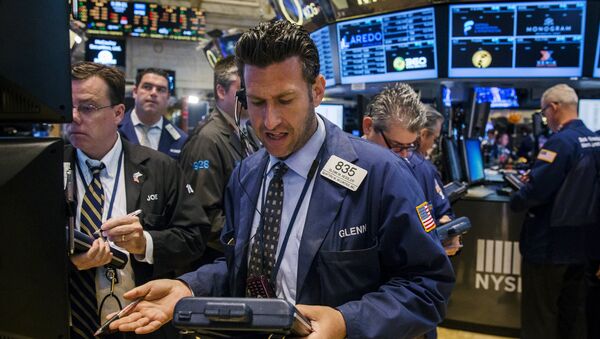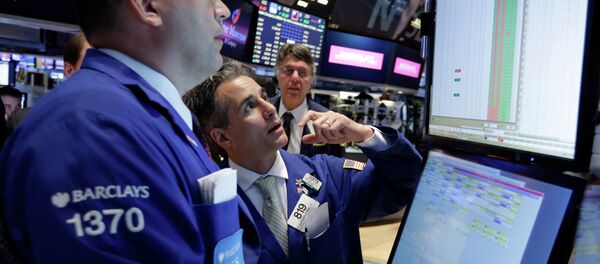Kristian Rouz — Wall Street opened mostly in the green on Thursday, however, the wider bag of stock and bond data suggest mixed results with a negative longer-term trend prevailing more clearly. While the talks between the indebted Greece and its IMF and EU creditors have intensified ahead of the nearing deadline for Athens to default, a more favourable macroeconomic outlook for the US initially pushed US stock up. However, as US economic expansion accelerates, the next stage of US monetary tightening is closer.
Meanwhile, today The S&P 500 Index is just 0.1% up to 2,108.83 points — somewhat of a withdrawal after the initial gains of 0.3% at the open. The Dow Jones Industrial Avg Index rose just below 0.1%, to 17,970.77 points, compared to the initial rise of 0.39%. The Nasdaq Composite is also up 0.1%, well below the initial gains of 0.37%. That means the data optimism and the positive effects of the news of the ongoing constructive discussions over the proposed solutions to the Greek stalemate is wearing thin.
The macro data is solid, and slightly above the expectations somewhat. The US consumer spending posted its greatest rise in nearly six year this past May with the accelerated demand for cars and certain other expensive durable goods leading the build-up. According to the US Department of Commerce, consumer demand added 0.9% (compared to 0.7% previously forecast), the biggest rise since August 2009, while this year's April's figure was revised upward to 0.1%. The indicator suggests a faster economic expansion in Q2 as consumer demand drives some 71% of the US economy.
Savings rate of the US households dropped from 5.4% to 5.1% in May, pushing inflation 0.1% higher.
Meanwhile, the financial storm is brewing inside the global financial system. With wide-scale stimulus programmes intact in Japan and the Eurozone, and the US Fed gradually tightening its policies, the overwhelming volumes of artificial monetary liquidity is flooding the US market, naturally pushing the stocks higher. Most US financials thus are heavily dependent on monetary policies of the foreign nations, and risks like the Greek debt stalemate or bursts of bubbles brewing in mainland China, if unravelled, will significantly impair the US stocks performance. That said, the longer-term investment outlook for the US is slowly turning negative, mainly due to the US Fed idling for quite a long time already (last major Fed policy measure came about last autumn).



